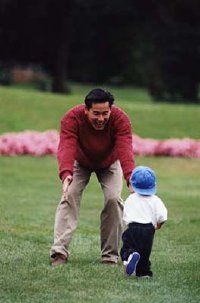As children begin to learn about the world around them, their limited experience does not equip them to understand a lot of what they see. Consequently, for the moment children learn to talk, they usually start asking questions.
General Tips
To foster your child's trust in you and his confidence that the answers you give are reasonable and valid, consider following these guidelines:
- Be willing to answer questions when your child asks them. If the timing is very inconvenient, promise you'll talk later, then bring up the subject yourself as soon as you can.
- Take your child's questions seriously; even those that seem frivolous or unimportant to you are still worth your attention. Answer them candidly and matter-of- factly, avoiding sentimentality.
- Don't lie or try to whitewash facts, but don't feel you have to go into every topic completely, especially for a young child. Remember that your answer must fit a short attention span; try to respond only to the question asked, giving your child just the information he asks for and he can handle.
- Be prepared to repeat your answers many times, especially those on the most important topics. Children need repetition to test facts to be sure they remain the same from day to day.
- Notice how a repeated question is phrased. It may seem to be the same question he asked before, but your child may be returning for slightly expanded information, after having digested one or two facts.
- Be aware that children younger than four years of age have a very imperfect sense of time and no understanding at all of permanence. Forever means almost nothing to them, and you have to repeat the word often when it is part of an answer you give.
- Remember that children are often unable to give the proper weight to the importance of information. They frequently ask what seem to adults to be trivial or insensitive questions about important topics, some apparently almost designed to hurt, when they simply don't have enough information or experience to be tactful or considerate.
Dealing With Death
One concept that many children have a hard time understanding is death. Parents today often find it harder to talk about death with their children than about sex -- a reversal from Victorian days, when sex was never discussed among proper people, but death was accepted as a matter of fact. Children learned about death when they saw their relatives die at home and attended wakes and family funerals in the parlor. Today people die in hospitals or nursing homes, and many children grow up having never seen a dead body or attended a funeral. Death has become a taboo subject, a shameful secret we ignore, hoping with futile foolishness that it won't come close to us.
Ideally, your child has some comprehension of death before a loved person dies. When you come across dead birds and insects on nature walks or when a family pet dies, you have an opportunity to explain that everything that lives eventually dies. Facts need repeating, of course, but in the course of a few brief experiences, you can talk about how plants, insects, animals, and people live on different time scales; how dead bodies disintegrate and return to nature; and how the dead do not return. One simple way to help children grasp the reality of death is to discuss it in terms of the absence of certain functions: Dead flowers no longer grow and bloom; the dead dog no longer breathes, barks, or eats.
You can also discuss deaths in stories you read to your child. Your library or bookstore offers many excellent children's books that deal specifically withdeath. Remind your child, when you watch television together, that cartoons are make-believe. They usually give the impression death is reversible, temporary, and impersonal; characters rise up whole and go about their business after having been smashed or blown to pieces. Another misconception your child can pick up from television programs and books is that only the wicked die. Your aim in all this is not to fill your child's head with depressing facts, but simply to prepare her a little for the inevitable death of a loved person.
Your child will undoubtedly ask most of the questions about death when a friend or family member has died and you are upset and grieving. Talking about the death and formulating the answers that most help your child will be very difficult for you. Try to remember that you want to be honest with your child, and protecting her from the truth ultimately harms you both. The normal steps of grief are denial, anger, guilt, and, finally, acceptance. Your child's questions will probably fall into these stages, and she will ask you to repeat the answers often. A child's reactions to death are hard to predict, but there are some typical patterns.
Guilt and Anger
To counter denial, tell your child as often as necessary that yes, Grandpa is dead, and will not return, but those who love him will always remember him. Do not use misleading terms such as "sleeping" and "gone away"; the first may well make your child afraid to go to bed, and the second leads her to expect Grandpa's return. And do not use confusing euphemisms such as "called home" and "happy in heaven." Your child will find it hard to understand why people are sad when death sounds so good.
If your child shows anger at the doctor for not curing Grandpa or at God for letting him die, it is probably best to be empathetic. Other family members are angry, too, you can explain, but anger won't change the situation. You can also encourage play therapy if your child is old enough to act out roles with dolls or stuffed animals.
It is in the area of guilt that a vital but not verbalized question may occur: Your child will wonder if she is responsible for Grandpa's death. Children often feel responsible for a death because they have misbehaved or have told someone to go away. Your reassurance is necessary. Continue to talk about Grandpa, stressing always the fun your child had with him and how much Grandpa loved the child.
When your child seems to have accepted the reality of the death, allow her to cry with you, to share your sadness, to complete the grieving process. Continue to talk about Grandpa, visit the grave together, if you wish. Explain and let your child share in any commemorative activities you perform, such as contributing to an organization or planting a tree.
At some point after the death, your child may feel a great deal of fear -- fear she will die, fear you will die and leave her alone and uncared for, nameless fear that if Grandpa can die, anything terrifying and horrible can happen. In spite of your constant reassurance, your child may regress in areas in which she had recently made strides foward, such as night waking, toilet training, or eating. Bear with her; the stage will pass.
Another question your child will inevitably have -- especially if he or she is about to get a baby brother -- is where babies come from. In the next section, we will offer some suggestions for answering your child's questions about reproduction and sexuality.
This information is solely for informational purposes. IT IS NOT INTENDED TO PROVIDE MEDICAL ADVICE. Neither the Editors of Consumer Guide (R), Publications International, Ltd., the author nor publisher take responsibility for any possible consequences from any treatment, procedure, exercise, dietary modification, action or application of medication which results from reading or following the information contained in this information. The publication of this information does not constitute the practice of medicine, and this information does not replace the advice of your physician or other health care provider. Before undertaking any course of treatment, the reader must seek the advice of their physician or other health care provider.



